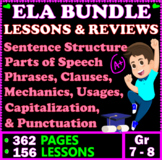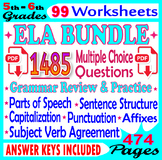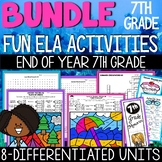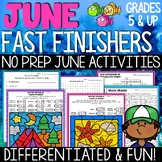49 results
7th grade Common Core L.11-12.5 homeschool curricula
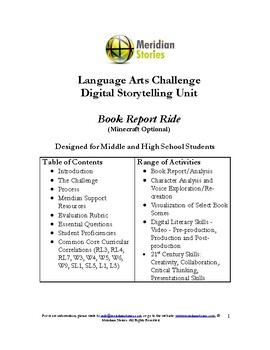
Book Report Ride
Book Reports can be kind of a drag. So, let’s make it into a ride. Using Minecraft or any other form of visual presentation – stop-motion, animation, live action video or graphic stills – take us on a roller coaster-like journey through three seminal scenes in your book. You pick the scenes, write the narration for this journey (only one voice), and bring us to a place where we won’t be able to resist reading the book ourselves.
Grades:
5th - 12th, Adult Education
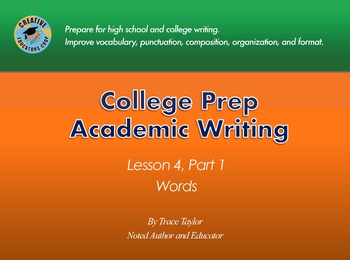
Academic Writing Lesson 4 Part 1: Words
One of 30+ lesson plans that make up a middle school advanced placement and high school writing curriculum that prepares and leverages students for collegiate level writing. Note that this 1-30 academic writing curriculum will cover all of the writing standards from 5th to 12th grades as a whole, not individually. The whole is engineered to cover all aspects of writing and relative language mastery expected at the college level.This lesson is the first part of a deep dive into into words and the
Subjects:
Grades:
6th - 12th, Higher Education, Adult Education
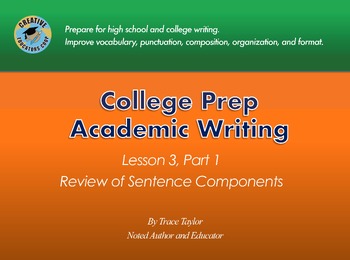
Academic Writing Lesson 3 Part 1: Review of Sentence Components
One of 30+ lesson plans that make up a middle school advanced placement and high school writing curriculum that prepares and leverages students for collegiate level writing. Note that this 1-30 academic writing curriculum will cover all of the writing standards from 5th to 12th grades as a whole, not individually. The whole is engineered to cover all aspects of writing and relative language mastery expected at the college level.This lesson reviews foundational language and writing knowledge. Not
Subjects:
Grades:
6th - 12th, Higher Education, Adult Education
Types:
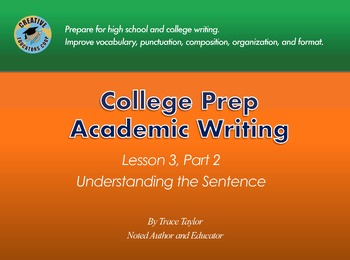
Academic Writing Lesson 3 Part 2: Understanding the Sentence
One of 30+ lesson plans that make up a middle school advanced placement and high school writing curriculum that prepares and leverages students for collegiate level writing. Note that this 1-30 academic writing curriculum will cover all of the writing standards from 5th to 12th grades as a whole, not individually. The whole is engineered to cover all aspects of writing and relative language mastery expected at the college level.This lesson is a deep dive into the constructions and components of
Subjects:
Grades:
6th - 12th, Higher Education, Adult Education
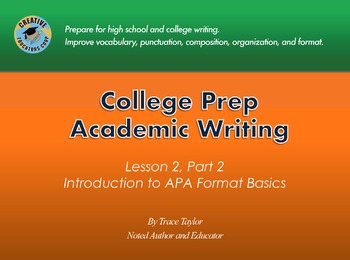
Academic Writing Lesson 2 Part 2: Introduction Format Basics
One of 30+ lesson plans that make up a middle school advanced placement and high school writing curriculum that prepares and leverages students for collegiate level writing. Note that this 1-30 academic writing curriculum will cover all of the writing standards from 5th to 12th grades as a whole, not individually. The whole is engineered to cover all aspects of writing and relative language mastery expected at the college level.This lesson continues the introduction to APA formatting for academi
Subjects:
Grades:
6th - 12th, Higher Education, Adult Education
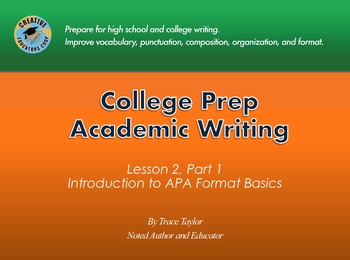
Academic Writing Lesson 2 Part 1: Introduction to APA Format Basics
One of 30+ lesson plans that make up a middle school advanced placement and high school writing curriculum that prepares and leverages students for collegiate level writing. Note that this 1-30 academic writing curriculum will cover all of the writing standards from 5th to 12th grades as a whole, not individually. The whole is engineered to cover all aspects of writing and relative language mastery expected at the college level.This 2nd lesson in 2 parts instructs on the APA formatting required
Subjects:
Grades:
6th - 12th, Higher Education, Adult Education
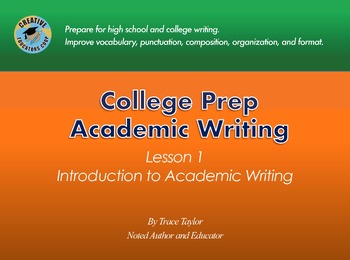
Academic Writing Lesson 1: Intro to Academic Writing
One of 30+ lesson plans that make up a middle school advanced placement and high school writing curriculum that prepares and leverages students for collegiate level writing. Note that this 1-30 academic writing curriculum will cover all of the writing standards from 5th to 12th grades as a whole, not individually. The whole is engineered to cover all aspects of writing and relative language mastery expected at the college level.This 1st lesson gives an overview of what academic writing is and wh
Subjects:
Grades:
6th - 12th, Higher Education, Adult Education

Journalism 101 Class
A fully comprehensive introduction to Journalism curriculum/course/lesson plan. Suitable for high school students to freshman/sophomore college students. Full semester of teacher/learning materials (12 weeks of instruction material). Covers the following material: Foundational Principals of Journalism; Basics of All Journalism; Types of Stories/Sections Within the Paper (features, editorials, sports, etc.); Media Law; Media Ethics; Community Journalism; Radio Journalism; Online Journalism; Photo
Subjects:
Grades:
7th - 12th, Higher Education
CCSS:
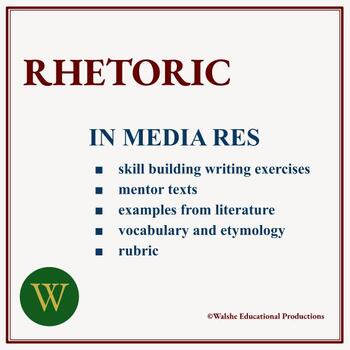
Rhetoric Lesson Twenty-five: In Media Res
Rhetoric lessons are a great way of introducing students to figures of speech and how to use them. This no-prep lesson in In Media Res is the twenty-fifth in my series of thirty rhetoric lessons. Simple, easy to follow instructions and examples are included, along with practice exercises and a rubric. I use these lessons with students from grades 7 to 12. They enjoy the simple challenge of writing according to the form of each rhetorical device. Students from a variety of skill levels, including
Subjects:
Grades:
7th - 12th, Adult Education
CCSS:
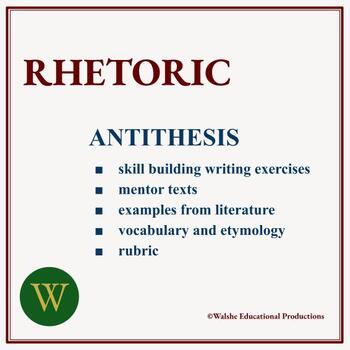
Rhetoric Lesson Twenty-six: Antithesis
Rhetoric lessons are a great way of introducing students to figures of speech and how to use them. This no-prep lesson in antithesis is the twenty-sixth in my series of thirty rhetoric lessons. Simple, easy to follow instructions and examples are included, along with practice exercises and a rubric. I use these lessons with students from grades 7 to 12. They enjoy the simple challenge of writing according to the form of each rhetorical device. Students from a variety of skill levels, including E
Subjects:
Grades:
7th - 12th, Adult Education
CCSS:
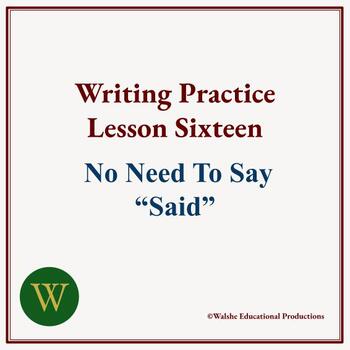
Writing Practice Lesson Sixteen: No Need To Say "Said"
This no-prep Writing Practice lesson, "No Need To Say 'Said'" is the sixteenth in my series of twenty-five Writing Practice lessons. Students learn that when writing dialogue, they can avoid repetitive uses of "said", "says" etc. This activity encourages creative problem solving as students find better ways to attribute quoted speech to specific characters. After reading original examples, they practice using descriptive phrases to indicate who is speaking.I've used this activity with hundreds
Subjects:
Grades:
7th - 12th, Adult Education
CCSS:
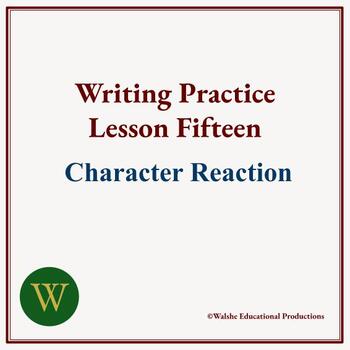
Writing Practice Lesson Fifteen: Character Reaction
This no-prep Writing Practice lesson, "Character Reaction" is the fifteenth in my series of twenty-five Writing Practice lessons. Students read about how character reaction works, study original examples and then practice using this important narrative writing skill.I've used this activity with hundreds of students both in school and as a Writing teacher. This lesson, like all my lessons, is made to be accessible to students by giving them the opportunity to practice their skills in the context
Grades:
7th - 12th, Adult Education
CCSS:
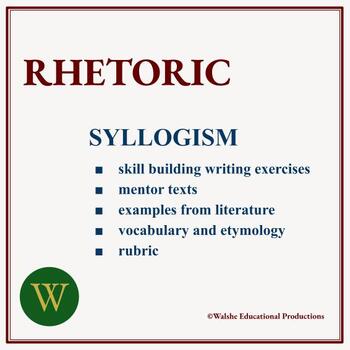
Rhetoric Lesson Twenty-one: Syllogism
Rhetoric lessons are a great way of introducing students to figures of speech and how to use them. This no-prep lesson in syllogism is the twenty-first in my series of thirty rhetoric lessons. Simple, easy to follow instructions and examples are included, along with practice exercises and a rubric. I use these lessons with students from grades 7 to 12. They enjoy the simple challenge of writing according to the form of each rhetorical device. Students from a variety of skill levels, including En
Subjects:
Grades:
7th - 12th, Adult Education
CCSS:
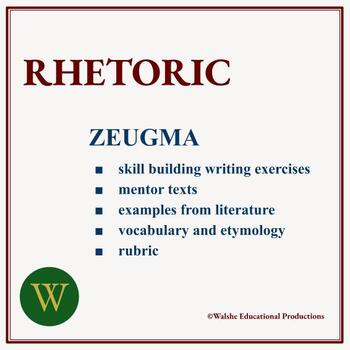
Rhetoric Lesson Twenty-seven: Zeugma
Rhetoric lessons are a great way of introducing students to figures of speech and how to use them. This no-prep lesson in antithesis is the twenty-seventh in my series of thirty rhetoric lessons. Simple, easy to follow instructions and examples are included, along with practice exercises and a rubric. I use these lessons with students from grades 7 to 12. They enjoy the simple challenge of writing according to the form of each rhetorical device. Students from a variety of skill levels, including
Subjects:
Grades:
7th - 12th, Adult Education
CCSS:
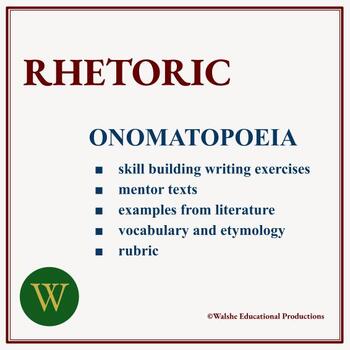
Rhetoric Lesson Twenty-four: Onomatopoeia
Rhetoric lessons are a great way of introducing students to figures of speech and how to use them. This no-prep lesson in onomatopoeia is the twenty-fourth in my series of thirty rhetoric lessons. Simple, easy to follow instructions and examples are included, along with practice exercises and a rubric. I use these lessons with students from grades 7 to 12. They enjoy the simple challenge of writing according to the form of each rhetorical device. Students from a variety of skill levels, includin
Subjects:
Grades:
7th - 12th, Adult Education
CCSS:
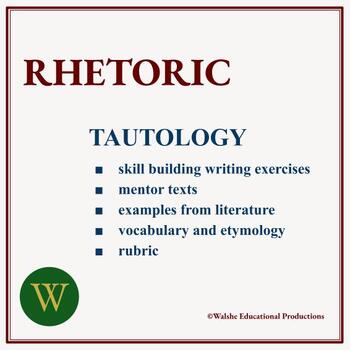
Rhetoric Lesson Twenty-two: Tautology
Rhetoric lessons are a great way of introducing students to figures of speech and how to use them. This no-prep lesson in tautology is the twenty-second in my series of thirty rhetoric lessons. Simple, easy to follow instructions and examples are included, along with practice exercises and a rubric. I use these lessons with students from grades 7 to 12. They enjoy the simple challenge of writing according to the form of each rhetorical device. Students from a variety of skill levels, including E
Subjects:
Grades:
7th - 12th, Adult Education
CCSS:
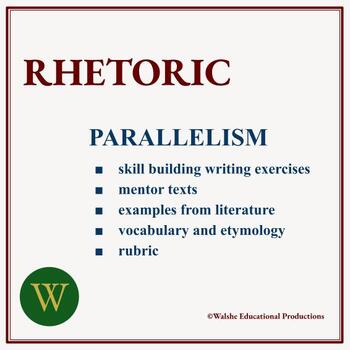
Rhetoric Lesson Twenty: Parallelism
Rhetoric lessons are a great way of introducing students to figures of speech and how to use them. This no-prep lesson in parallelism is the twentieth in my series of thirty rhetoric lessons. Simple, easy to follow instructions and examples are included, along with practice exercises and a rubric. I use these lessons with students from grades 7 to 12. They enjoy the simple challenge of writing according to the form of each rhetorical device. Students from a variety of skill levels, including Eng
Subjects:
Grades:
7th - 12th, Adult Education
CCSS:
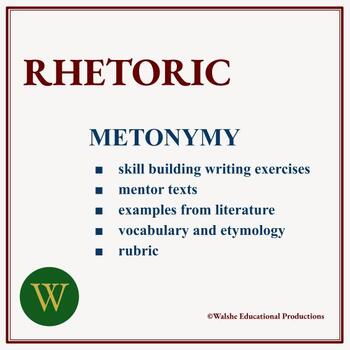
Rhetoric Lesson Thirty: Metonymy
Rhetoric lessons are a great way of introducing students to figures of speech and how to use them. This no-prep lesson in metonymy is the thirtieth in my series of thirty rhetoric lessons. Simple, easy to follow instructions and examples are included, along with practice exercises and a rubric. I use these lessons with students from grades 7 to 12. They enjoy the simple challenge of writing according to the form of each rhetorical device. Students from a variety of skill levels, including Englis
Subjects:
Grades:
7th - 12th, Adult Education
CCSS:
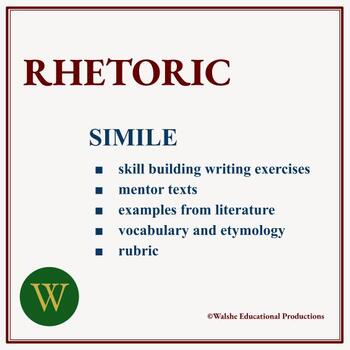
Rhetoric Lesson Twenty-nine: Simile
Rhetoric lessons are a great way of introducing students to figures of speech and how to use them. This no-prep lesson in simile is the twenty-ninth in my series of thirty rhetoric lessons. Simple, easy to follow instructions and examples are included, along with practice exercises and a rubric. I use these lessons with students from grades 7 to 12. They enjoy the simple challenge of writing according to the form of each rhetorical device. Students from a variety of skill levels, including Engli
Subjects:
Grades:
7th - 12th, Adult Education
CCSS:
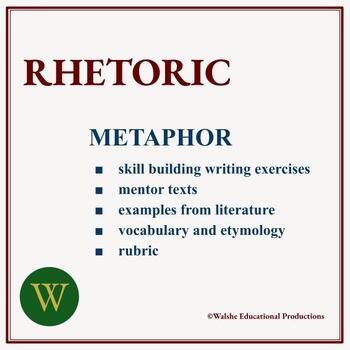
Rhetoric Lesson Twenty-eight: Metaphor
Rhetoric lessons are a great way of introducing students to figures of speech and how to use them. This no-prep lesson in metaphor is the twenty-eighth in my series of thirty rhetoric lessons. Simple, easy to follow instructions and examples are included, along with practice exercises and a rubric. I use these lessons with students from grades 7 to 12. They enjoy the simple challenge of writing according to the form of each rhetorical device. Students from a variety of skill levels, including En
Subjects:
Grades:
7th - 12th, Adult Education
CCSS:
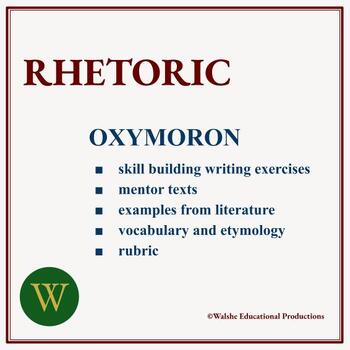
Rhetoric Lesson Thirteen: Oxymoron
Rhetoric lessons are a great way of introducing students to figures of speech and how to use them. This no-prep lesson in oxymoron is the thirteenth in my series of thirty rhetoric lessons. Simple, easy to follow instructions and examples are included, along with practice exercises and a rubric. I use these lessons with students from grades 7 to 12. They enjoy the simple challenge of writing according to the form of each rhetorical device. Students from a variety of skill levels, including Engli
Subjects:
Grades:
7th - 12th, Adult Education
CCSS:
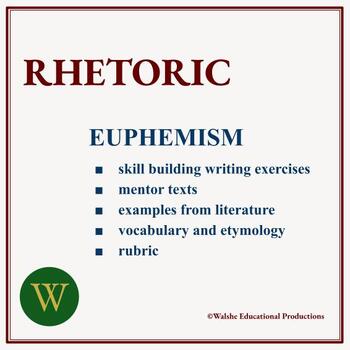
Rhetoric Lesson Twenty-three: Euphemism
Rhetoric lessons are a great way of introducing students to figures of speech and how to use them. This no-prep lesson in euphemism is the twenty-third in my series of thirty rhetoric lessons. Simple, easy to follow instructions and examples are included, along with practice exercises and a rubric. I use these lessons with students from grades 7 to 12. They enjoy the simple challenge of writing according to the form of each rhetorical device. Students from a variety of skill levels, including En
Subjects:
Grades:
7th - 12th, Adult Education
CCSS:
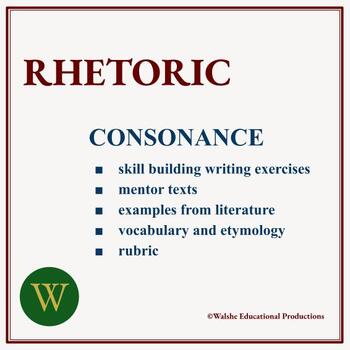
Rhetoric Lesson Nineteen: Consonance
Rhetoric lessons are a great way of introducing students to figures of speech and how to use them. This no-prep lesson in consonance is the nineteenth in my series of thirty rhetoric lessons. Simple, easy to follow instructions and examples are included, along with practice exercises and a rubric. I use these lessons with students from grades 7 to 12. They enjoy the simple challenge of writing according to the form of each rhetorical device. Students from a variety of skill levels, including Eng
Subjects:
Grades:
7th - 12th, Adult Education
CCSS:
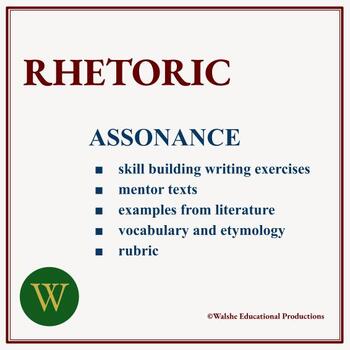
Rhetoric Lesson Eighteen: Assonance
Rhetoric lessons are a great way of introducing students to figures of speech and how to use them. This no-prep lesson in assonance is the eighteenth in my series of thirty rhetoric lessons. Simple, easy to follow instructions and examples are included, along with practice exercises and a rubric. I use these lessons with students from grades 7 to 12. They enjoy the simple challenge of writing according to the form of each rhetorical device. Students from a variety of skill levels, including Engl
Subjects:
Grades:
7th - 12th, Adult Education
CCSS:
Showing 1-24 of 49 results

